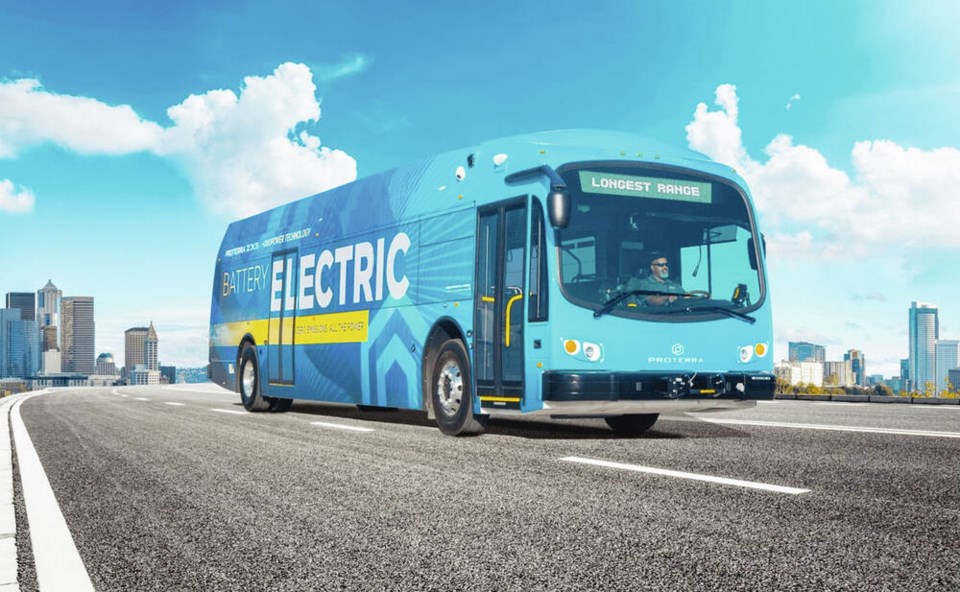A fully electric transit bus is expected to begin serving Greater Victoria passengers in September, followed by 10 new electric buses in summer 2023, as the fleet transitions to an emission-free future.
The goal is for all B.C. Transit buses to run on electricity by 2040.
Once the 10 new buses are in service, the first bus — on loan from California-based manufacturer Proterra Operating Co. Inc. — will be returned to the company. Proterra won a $20-million contract to supply electric buses to B.C. Transit.
The federal government is paying 40 per cent of the cost, while the province covers another 40 per cent and the remainder is from the Victoria Regional Transit Commission.
The loaned electric bus is expected to help B.C. Transit drivers and operations and maintenance staff to become familiar with the new vehicle.
B.C. Transit anticipates it will buy more electric buses, chargers and supporting services from Proterra. Five hundred additional buses could be replaced within the next decade, B.C. Transit said in a statement.
Charging infrastructure for the new buses will be installed at the Victoria transit centre on Gorge Road.
Proterra is building the 10 Victoria-bound buses in Greenville, South Carolina, said Aaron Lamb, B.C. Transit’s vice-president of asset management and chief sustainability officer. The vehicles will likely be delivered by truck. Each will have 36 seats — each with its own USB port — and be able to carry up to 66 passengers.
They will have the same colours and exterior design as the current fleet, as well as similar flooring and seats, Lamb said. “From a customer standpoint, the main thing that they are going to definitely experience is just that quietness … smooth acceleration that you feel with electric propulsion.”
There is little vibration in an electric bus because it does not have moving mechanical components — and no engine noise.
It is not yet known which route the loaner bus will be used on.
The electric buses are about a foot longer than conventional 40-foot-long buses, but B.C. Transit has had buses that length before, so it won’t be a problem, Lamb said. The width is the same as for existing buses.
B.C. Transit spokesman Jamie Weiss said each electric bus will have a regular driving range of 350 to 500 kilometres, depending on conditions. Factors affecting performance include temperature, humidity, interior cabin temperature, number of passengers, type of route, operator driving style, Weiss said.
Buses will have heat pumps to cut back on energy needed for heating and increase range.
Weiss said the buses will be among the first battery electric buses in North America to come with that technology.
In Greater Victoria, some diesel buses have been replaced by 43 compressed-natural-gas buses, primarily deployed out of Langford, Lamb said. Those CNG buses will be replaced with electric buses as they reach the end of their lives. Buses typically last 13 to 15 years.
Greater Victoria riders are currently served by about 350 buses, including 193 heavy-duty models, lighter duty units, double-deckers and handyDARTs.
As B.C. Transit continues to roll out its low-carbon fleet program, electric buses will be delivered to other communities, likely starting in 2024, Lamb said.
The low-carbon fleet program was announced in 2019, aiming to replace about 1,200 buses with electric buses within 10 years.
• To comment on this article, write a letter to the editor: [email protected]



